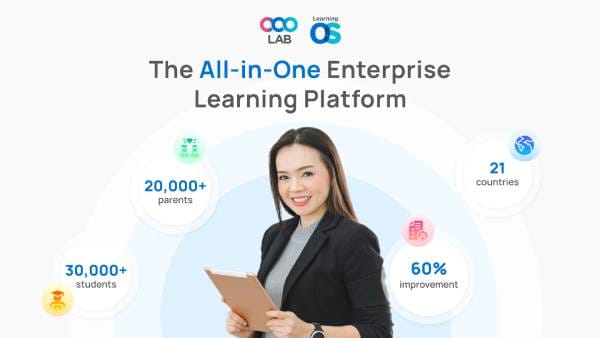Staying abreast of technological progress poses a dilemma for businesses regardless of their size or structure. While technology presents promising prospects for business growth, it also generates skill shortages, notably in industries like manufacturing, healthcare, and construction, which have a pronounced need for skilled labor.
To address this challenge and retain their existing workforce, employers must adopt strategies. Among these, the capacity to upskill employees stands out as pivotal. This involves a company's commitment to training and enhancing the skill sets of its workforce, granting it a substantial edge in an ever more technology-centric environment. Let's find out about the benefits of employee upskilling.
I. What is employee upskilling

Employee upskilling refers to the process of providing additional training, education, or development opportunities to existing employees to enhance their skills, knowledge, and capabilities. This could involve offering courses, workshops, seminars, online training programs, mentorship, or on-the-job training to help employees acquire new skills relevant to their current roles or future career progression within the organization.
Upskilling initiatives are designed to ensure that employees remain competitive in their roles, adapt to technological advancements, industry changes, and evolving job requirements. By investing in employee upskilling, organizations aim to improve productivity, innovation, employee satisfaction, and retention, ultimately contributing to the overall success and competitiveness of the business.
II. Benefits of employee upskilling
Upskilling your employees is essential for business success for several reasons:
1. Adaptability to Change
In today's fast-paced world, industries are constantly evolving due to technological advancements and changing market dynamics. Upskilling equips employees with the knowledge and skills necessary to adapt to these changes effectively, ensuring that your business remains competitive and resilient.
2. Increased Productivity
Employees who are proficient in the latest tools, technologies, and methodologies are likely to be more productive. Upskilling enhances their efficiency and effectiveness in performing their roles, leading to improved performance and output for your business.
3. Employee Engagement and Retention
Investing in the development of your employees demonstrates that you value their growth and professional advancement. This fosters a sense of loyalty and commitment among your workforce, reducing turnover rates and the associated costs of recruitment and onboarding.
4. Innovation and Creativity
Upskilling encourages employees to think critically and creatively, enabling them to contribute innovative ideas and solutions to organizational challenges. A skilled workforce is better equipped to identify opportunities for improvement and drive innovation within your business.

5. Enhanced Customer Satisfaction
Employees who are well-trained and knowledgeable can provide better customer service and support. Upskilling enables them to understand customer needs more effectively, leading to higher levels of customer satisfaction and loyalty.
>>> Read more: Choose the Right Content Authoring Tools to Scale your E-Learning Business
6. Future-Proofing Your Business
By investing in upskilling now, you are preparing your workforce for the future. As job roles evolve and new technologies emerge, having a skilled workforce ensures that your business can adapt and thrive in the face of uncertainty.
III. How does an Learning Management System (LMS) support employee upskilling?
Centralized Learning Platform: An LMS provides a centralized platform where employees can access a wide range of learning materials, including courses, videos, documents, and quizzes. This makes it convenient for employees to engage in upskilling activities from anywhere, at any time.
Personalized Learning Paths: LMS platforms often offer the ability to create personalized learning paths tailored to individual employee needs and career goals. Employees can receive recommendations for courses and training modules based on their job roles, skill gaps, and learning preferences, allowing them to focus on areas relevant to their professional development.
Flexible Learning Options: LMS platforms support various learning formats, such as self-paced courses, instructor-led training, webinars, and microlearning modules. This flexibility enables employees to choose the learning methods that best suit their schedules and preferences, promoting engagement and participation in upskilling activities.
Progress Tracking and Reporting: LMS systems track employees' progress and performance in their upskilling efforts, allowing both employees and managers to monitor their development over time. Managers can generate reports to assess the effectiveness of upskilling programs, identify areas for improvement, and make data-driven decisions to support employee development initiatives.
Certification and Credential Management: Many LMS platforms offer features for managing certifications and credentials obtained through upskilling programs. Employees can earn badges, certificates, or other credentials upon completion of courses or training modules, providing tangible recognition of their newly acquired skills and knowledge.
Integration with HR Systems: LMS platforms often integrate with HR systems, such as performance management and talent development software, to streamline administrative tasks related to employee upskilling. This integration allows HR professionals to align upskilling initiatives with broader talent management strategies and ensure that employee development efforts support organizational goals.
>>> Read more: Tips and LMS Features for delivering effective feedback that scales learning
>>> Read more: The ultimate guide to choosing an LMS for online and hybrid education
>>> Read more: How enrichment centers can skyrocket student success with the right LMS
Customize and utilize your LMS today

IV. Conclusion
Overall, upskilling your employees is not just an option; it's a strategic imperative for ensuring the long-term success and sustainability of your business in today's rapidly changing business landscape.
With an LMS serves as a powerful tool for supporting employee upskilling by providing a flexible, accessible, and personalized learning environment that empowers employees to enhance their skills and knowledge continuously.
About us
At OOOLAB (pronounced 'uːlæb'), our mission is to make complex learning operations simple. We aim to positively impact the lives of over 1,000,000 learners and educators by the end of 2026.
OOOLAB's LearningOS provides educational institutions and corporate enterprises with an all-in-one solution to create and deliver engaging learning experiences.
Reach out to us at: Linkedin, FaceBook


